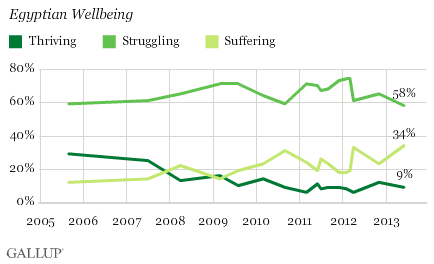From Gallup, data on Egyptian perceptions of well-being in the last eight years. When 1/3 of your population feels it is "suffering" you have a big problem on your hands.
Here are the results of a poll of 1200 likely voters by the national Al Ahram newspaper:
1. Amr Moussa, former head of the Arab League: 31.5%
2. Salafi sheikh Hazem Salah Abu Ismail: 22.7%
3. Mubarak-appointed (and short-lived) interim prime minister Ahmad Shafiq: 10.2%
4. Mubarak intelligence chief Omar Suleiman (who has not officially announced his candidacy): 9.3%
5. Former Brotherhood leader and Islamist moderate Abdel Moneim Aboul Fotouh: 8.3%
6. Leftist opposition figure Hamdeen Sabahi: 4.9%
Of course these results have probably already been changed significantly by the entrance into the field of Muslim Brotherhood leader and candidate Khairat El Shater. The poll also notes that 94.5% of respondents said they planned to vote.
LOS ANGELES -- As Egyptians mark the first anniversary of the revolution that toppled their last president, 82% believe that the military will relinquish power to a civilian government after they elect their next president.
Despite continued protests in Tahrir Square since former Egyptian President Hosni Mubarak's overthrow one year ago, 88% of Egyptians still express confidence in the military generally and 89% are confident in the Supreme Council of the Armed Forces (SCAF) specifically. Still, the majority (63%) think it would be bad for the military to remain involved in politics after the presidential election.
Slightly more than one in four Egyptians (27%) believe it is a good thing for the military to remain involved in politics after the presidential election. This suggests there is a sizable minority of Egyptians who see the military as a safety net in the nation's nascent journey with democracy.
Egyptians Universally Reject Any Further Election Delays
Nearly 9 in 10 Egyptians say delaying the presidential election, expected to take place before June 30, 2012, would be a bad thing for their country. This places significant pressure on the military leadership of the country to secure free, fair, and timely elections.
In addition to the above poll on the military also see their findings on voters' decision in the Egyptian parliamentary elections. They suggest that between September and November 2011 respondents became more inclined to vote for Islamist parties (Nour and FJP). This probably reflects the tiredness with protests that followed the July Tahrir sit-in and attempts to restart them in September, the September 9 raid on the Israeli embassy, and the Islamists parties campaigning efforts during and after Ramadan.

Also interesting are indications of a change of mind of people who were against FJP even as numbers for those against Nour remained steady between September and December – perhaps a sign that the FJP's strategy of presenting itself as the party of order and stability paid dividents.

From a recent RAND poll of Iranians:
- A majority of respondents view the economy as being “average” or better, though many may have hesitated to express their dismay with the economic situation.
- In general, gender and education level were important predictors of attitudes. Women and less-educated respondents tended to voice views on security and overall relations that were unfavorable to the United States. Men and those with greater social means tended to be more favorably inclined.
- A majority of respondents expressing an opinion opposed the reestablishment of ties with the United States. Women and less-educated respondents were least likely to favor the reestablishment of diplomatic relations, but those most comfortable with the survey were more likely to favor such reestablishment.
- Respondents were divided on the issue of nuclear weapons, with a significant portion favoring their development. Those most comfortable with the survey, men, and those with the highest level of education expressed the most opposition to development of nuclear weapons. The lower classes and those with the lowest level of education supported the development of nuclear weapons.
- A majority of respondents did not view sanctions as having a negative effect on the economy, though a significant number viewed sanctions as having a negative impact.Women, poorer respondents, and those most comfortable with the survey rated the impact of sanctions as most negative.
Like all surveys, take with a grain of salt. It's interesting that the higher the education level, the least in favor Iranians are of developing nuclear weapons. Perhaps it's because they understand better that, officially, Iran is not trying to develop weapons but secure its right (according to the NPT) to enrichment. Of course at the popular level on all sides of this conflict it's become about nukes, even when the real matter at hand is enrichment and inspections. I also don't quite understand why the pollster is making guesses about the willingness of Iranians to criticize the state of the economy (reported by some to be quite dire) and not take them at their word on this issue when they do on the other issues.
✪ Iranians Favor Diplomatic Relations With US But Have Little Trust in Obama - World Public Opinion | Iranian poll.
✪ Free Mohammad Othman | Solidarity campaign for Palestinian activist Muhammad Othman, arrested September 22 while crossing the Allenby bridge.
✪ AFP: Egypt press: UNESCO loss shows 'clash of civilisations' | Nationalist backlash in reaction to Farouk Hosni's loss.
✪ The Lucrative Business of Israel-Bashing - Jeffrey Goldberg | Savor the irony of this headline from a professional Palestine-basher sitting on his lucrative perch in American journalism. The content of this post if pure invective, what Goldberg now is professional nastiness (as in his recent attacks on Stephen Walt.)
✪ The Associated Press: Fraud allegations at UNESCO race | Rumors that Egyptian delegates offered $50k bribes going around.




